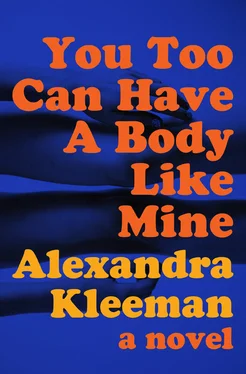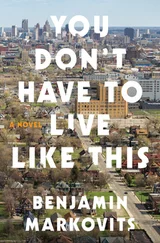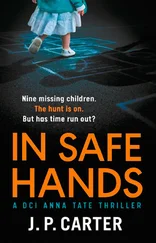C came back and leaned against the folding table. “That was the right decision,” he said happily.
“Good,” I said. I was looking across the room at a stack of folded white sheets three feet high. Next to it was a shorter stack, crisp and folded. There were dozens and dozens of sheets there, all carefully arranged, all of a blank, silky white.
“What do you think all those sheets are for?” I asked.
C looked over.
“Probably for the normal reasons,” he said. “What do you mean?”
“I saw something weird the other day,” I said.
C turned toward me, still doing something on his phone.
“Okay,” he said.
“I was watching from the roof,” I began. “The people across the street came home in the middle of the afternoon, which never happens. They went into their house for a while, maybe five minutes. A short while, like they already had everything prepared. Then when they came back out, they were all wearing white sheets with holes cut out for their eyes, like cheap ghost costumes. It looked really sloppy, the eyeholes didn’t even fit right on their heads. Then they got in their car and drove away, and they haven’t been back since.”
“What happened to their dog?” C asked. “The loud dog?”
“I don’t know,” I said. “I’ve been listening and I never hear it anymore.
“I listen all day long,” I added, more or less to myself.
“You’re sure they haven’t been back?” he asked, typing what I thought looked like a reply into his phone and pressing send. His face was smooth like a sheet.
“Well, not while I was home,” I said, sounding defensive, though I wasn’t sure why. “Obviously I haven’t been home for a few hours,” I said.
“Okay,” C said thoughtfully, as though he had made a decision. He put his phone in his pocket and pulled himself up to a standing position. “You’re a sensitive person, you saw something weird, you feel spooked. No pun intended. There are plenty of reasons why what you saw might have happened, and some of them are weird. But some of them are just boring. You know? That family could have been going to some kind of school pageant. Or a birthday party. So you can just ask yourself: Do I live in a weird town, or a boring town?”
I blinked at him.
“I’d say boring,” he added, nodding and then raising both eyebrows expectantly.
I loved his face, his bland white good-looking face. I believed in him and therefore in the boringness of my town. C was good at handling me. He made things suddenly, instantaneously normal, just by explaining them. He was like a magnifying glass, I only had to look through him to see the world in crisp detail. And he had a really nice smile and good teeth. They were so good that he had probably had braces once, and a retainer, and maybe even headgear. I saw him standing in the middle of a sunlit field, a child with a baseball bat in his hand and a mouth full of metal. Beneath a huge blue sky, he wheeled around on the grass, swinging his bat at butterflies. It was a scene so normal, it felt capable of infecting the neighboring parts of my mind, making me normal in turn. I smiled.
We stood around waiting for the clothes to dry, checking every couple of minutes, and when they were dry enough C dumped them into a wheeled bin that he rolled over to the folding table, where we turned item after item of rumpled clothing into neat little rectangles. C’s shirts were old and soft with nonsense slogans on them; there were three or four button-ups and a few pairs of pants. The older women had been replaced by other older women, similarly dressed but at the beginning of their laundering process, pouring capfuls of detergent, unloading jumbles of colorful things, and putting them into the washers. C piled his folded clothes back into the laundry bag and hoisted it over his shoulder. “Ready?” he asked, heading for the door.
I followed him out, but when I looked back from the doorway I saw an old woman, one of the ones who sat around the Laundromat all day watching the little ceiling-mounted TV and sucking on fruit-flavored hard candies. Sometimes for a few bucks she did other people’s laundry. Right now she was standing, holding up a white sheet, unfurled, and it was perfectly normal except for two holes that could be draped over the eyes.
I HAD STARTED DATING Ca couple of years ago, during the fall when fathers began vanishing from out of their comfortable, middle-class homes. For the first few weeks, local newscasters read out the list of the newly vanished each night along with the location in which they were last seen, and it sounded as if they were reading from a master catalog of legitimate, reasonable names, names like “Peter” and “Steve.” Ted Hartwell, Matt Skofield, Dennis Galp. None of them knew one another, and there was nothing to link them except that they were all equally average. Telephone poles and store windows went white with flyers depicting men in interchangeable hairstyles, clad in polo shirts, all traces of fun leached from their faces long ago. They wore confused expressions in the pictures selected by their family members, as if none of their kin had cared to warn them that photographs were going to be taken. Their confusion made it seem as though they had been lost for a long time, much longer than they had been gone.
The news anchors called it “Disappearing Dad Disorder.” For months nobody knew where the dads had gone, whether they had been stolen or had stolen themselves, victims of self-napping. Then last January dads started turning up, one by one. Good Samaritans found them wandering dazed in shopping malls five towns over, malls that were not their own but resembled their own to an uncanny degree. They would return to familiar stores like the Gap and try to buy khakis with little scraps of paper that they had collected from obscure places. They sat on the mall benches and closed their eyes, waiting for someone to claim them. Often they wore clothes identical to the ones they had disappeared in, identical but fresh smelling, as if they had been laundered or even bought new in the same sizes and colors. They were confused and quiet, preferring to stare off into the distance or fiddle with a key chain instead of engaging with those around them, those who asked them gently: Are you lost? Is your family looking for you? Do you have a number we can call? When questioned about their disappearance, whether they left or had been taken, who had taken them, did they remember his face, height, manner of dress, was it someone they knew from work, from home, from the bowling league, from the auto repair shop, was it many people, an organization, a religious group, a band of criminals, a league of sexual predators, the missing dads reproduced, with slight variations in phrasing, a single sentence: Sometimes you’ve just got to be content with things the way they are.
The emptiness of C’s apartment reminded me of those missing fathers. The place was nice the way car dealerships are nice: clean, spacious, cold, and full of light. He owned two of the same self-assembled couches and three identical self-assembled end tables, the cheapest model they made. They were all arranged in his living room, the couches side by side gaplessly and facing forward to the television set, the end tables pushed together in front of them to form a single, long, low table from which you could eat food if you hunched over and lowered your jaw almost to your knees. From the door, you could see the living room, kitchen, and a chunk of bedroom splayed before you like a blueprint of someplace an engineer had once thought might be all right to live in. I took a few steps forward and the bedroom came into view, a full-sized mattress on the floor with navy-blue sheets and a wad of comforter. Next to it, a laptop blinked drowsily.
Читать дальше




![Ally Carter - [Gallagher Girls 01] I'd Tell You I Love You But Then I'd Have to Kill You](/books/262179/ally-carter-gallagher-girls-01-i-d-tell-you-i-lo-thumb.webp)







